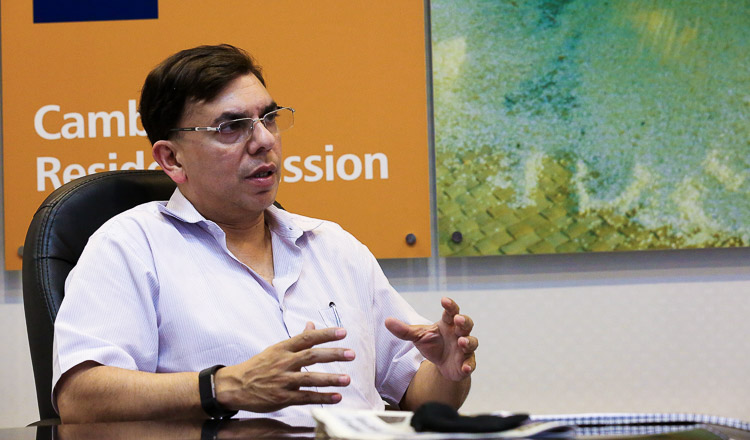Cambodia’s backbone is still the agriculture sector
Jayant Menon, lead economist for regional trade and cooperation at the Asian Development Bank in Manila, recently spoke to Khmer Times’ Sok Chan, and outlined how Cambodia could stay competitive by increasing its productivity.
KT: Cambodia’s main exports are garments, footwear and agricultural products destined for markets in the European Union and the US. How will the country’s exports be affected with Brexit?
Mr Menon: Cambodia is a small country. While its exports are a few key products, I see no big change with the UK leaving the European Union. I think there will be minimal effect on Cambodia.
For Cambodia, preferential treatment given to it by the EU in the Everything but Arms scheme is very important. The rest of Europe is still there even though the UK has decided to leave. The UK, anyway, is not a big market for Cambodia.
KT: Cambodia has moved to a lower middle income status from a least developed country (LDC), according to the World Bank. Due to this “graduation”, there are concerns that the country could lose some of its preferential treatment for its exports given to it by developed countries.
Mr Menon: It is the World Bank classification that Cambodia is a lower middle income nation. According to the United Nations Conference on Trade and Development (UNCTAD), Cambodia still has its LDC status. I don’t think Cambodia is at risk of losing its Generalised System of Preferences (GSP) status given to it by certain countries.
However, due thought must be given as Cambodia moves up the ladder and becomes an upper middle income nation, as it eventually graduates from its LDC status. It will have to adjust itself to not having preferential access to developed markets.
KT: What should Cambodia do to prepare for this income status graduation from an LDC?
Mr Menon: It needs to improve its tax collection mechanism and curb tax evasion. Cambodia needs do that by institution building and I think this is already happening. The country will need resources for its own development and the best way for that is to improve its tax base.
KT: What are the other challenges?
Mr Menon: There are a number of domestic constraints that need to be overcome, the most important of which is improving the skills set of workers. There must be more investment in education – not only in just vocational education but also in primary and secondary education. The goal is making sure all Cambodians have at least 10 years of schooling. That has to be the basic building block for a workforce.
Once you have this basic building block, then you can talk about specialised vocational education.
The other challenge is in the manufacturing sector, where operations could be affected by the high cost of electricity. Also red tape in bureaucracy needs to be cut to make the investment climate better.
KT: What do you see as Cambodia’s competitive edge compared to other Asean countries?
Mr Menon: Cambodia’s main exports are garments, textiles and agricultural products. Garments have preferential access in Europe, which is a very important market for Cambodia. For agriculture products, productivity could be increased by improving the irrigation system, improving fertiliser usage and also increasing the scale of production.
In the agriculture sector, Cambodia should also look at agro-processing which has better returns. Processing agricultural products, like pepper, cassava and coffee, adds value in the market chain and improves competitiveness.
KT: Chances of the Regional Comprehensive Economic Partnership (RCEP) deal being finalised by the end of the year seem slim, due to conflicting interests of the 16 participating countries in the trade agreement. How should Cambodia prepare for RCEP?
Mr Menon: Cambodia is an Asean member and the regional grouping is trying its best to conclude RCEP. This would create the world’s largest free trade area.
Now that the Trans-Pacific Partnership is no longer happening, RCEP will be the future and Cambodia should prepare itself to take advantage of this. As I said earlier, the country needs to improve the skills set of its workers, strengthen institutions, improve the rule of law, and tackle corruption and cut red tape to make the investment climate better for foreign investors.
RCEP is not probably happening this year. It’s more likely next year, but it is happening. Many countries [in RCEP] have different interests and there are difficulties trying to get the 10 members of Asean and their six trading partners – China, Japan, India, South Korea, Australia and New Zealand – to agree on a free trade agreement.
It’s all about compromise in areas like trade in goods and services, investments, intellectual property and e-commerce. RCEP would also be a good opportunity for the 16 countries to pursue trade reforms, so it should not be rushed.
KT: Cambodia is diversifying its economy and is keen to manufacture high value added products. How do you see the shift in the country’s workforce? Will this have an effect on the agriculture sector?
Mr Menon: It’s good that Cambodia is diversifying its economy. There is a lot of new investment from Japanese firms especially in the Phnom Penh Special Economic Zone. But let’s not forget the agriculture sector. That is the backbone of Cambodia and large number of Cambodians are employed in it – either directly or indirectly.
Thus, in terms of reducing poverty and reducing inequality, we have to focus on agriculture. We need to look at how we can increase productivity in the sector so that poverty can be addressed.
When we move down the path of agro-processing, we combine together both agriculture and manufacturing.
Source: http://www.khmertimeskh.com/5082185/cambodias-backbone-still-agriculture-sector/


 English
English




